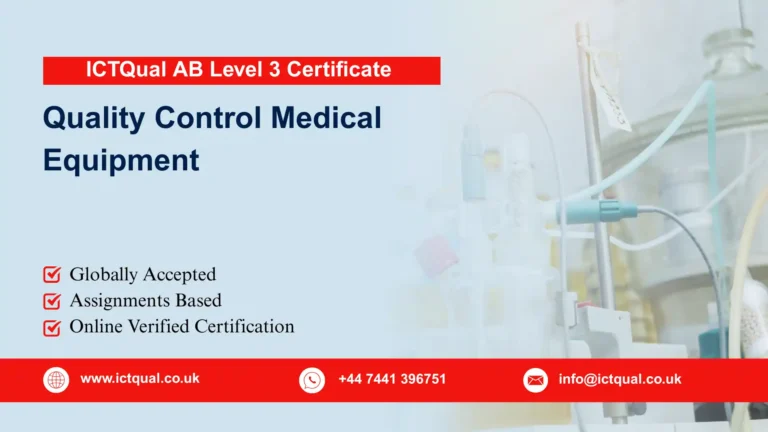Are you a dedicated support worker in the healthcare and social care sector, responsible for a range of tasks in community or care home settings? Or perhaps you’re seeking a career in this field and want to showcase your competence and skills? Look no further – the ProQual Level 2 Certificate is here to validate your expertise!
Our certificate program is tailored to individuals like you who perform a limited number of tasks but still play a crucial role in providing quality care. While a full Healthcare and Social Care Diploma may not be required for your job, this certificate empowers you to demonstrate your competence and meet industry standards.
The Level 2 Certificate delves into essential skills and knowledge directly applicable to your role. Enhance your communication abilities, ensuring effective interactions with individuals in your care, their families, and fellow healthcare professionals. Master health and safety practices to maintain a safe environment for all. Learn the art of person-centered care, safeguarding principles, and providing assistance with personal care and daily activities.
By enrolling in the ProQual Level 2 Certificate, you gain a deeper understanding of your responsibilities and acquire the necessary expertise to excel in your job. You’ll meet the expectations of your industry and demonstrate your competence and skills to employers.
But the benefits don’t end there! Completion of this certificate opens doors to enhanced career prospects. Stand out among your peers and increase your employability in roles that demand a range of tasks in community or care home settings. Employers will recognize your commitment to professionalism and dedication to providing exceptional support and care.
The ProQual Level 2 Certificate in Healthcare and Social Care Support Skills is your ticket to professional growth and recognition. It validates your skills, boosts your confidence, and empowers you to make a positive impact in the lives of those you support.
Don’t miss out on this opportunity to elevate your career. Enroll in the ProQual Level 2 Certificate in Healthcare and Social Care Support Skills today!
Contact us now to embark on your journey towards professional excellence in the healthcare and social care sector. Together, let’s make a difference!
The “ProQual Level 2 Certificate in Healthcare and Social Care Support Skills” is a recognized qualification specifically designed for individuals working in a variety of environments where they are expected to perform a range of Healthcare and Social Care tasks. This certificate is ideal for those who work in community or care home settings and are responsible for carrying out a limited number of tasks.
While these individuals may not be required to meet the full standards of a comprehensive Healthcare and Social Care Diploma, their industry demands that they demonstrate competence and skills in specific areas. The Level 2 Certificate provides them with the opportunity to showcase their abilities and attain a recognized qualification.
This certificate focuses on developing essential skills and knowledge that are directly applicable to the healthcare and social care sector. It covers a range of topics relevant to the job roles of support workers in community or care home settings. These topics may include communication skills, health and safety practices, person-centered care, safeguarding principles, and assisting individuals with personal care and daily activities.
By undertaking the ProQual Level 2 Certificate in Healthcare and Social Care Support Skills, individuals gain a deeper understanding of their roles and responsibilities in providing effective support and care. They acquire the necessary knowledge to meet industry standards and expectations, ensuring they can perform their tasks competently and confidently.
Completion of this certificate not only demonstrates an individual’s competence and skills but also enhances their career prospects. It allows them to meet the requirements set by the healthcare and social care industry and increases their employability in roles that involve a limited range of tasks.
.
To achieve the qualification candidates must achieve a minimum of 13 credits: a minimum of 8 credits must be from the Level 2 units and the remaining 5 credits can be from any combination of units from the Level 2 or Level 3 or Level 4 units
| Sr# | Unit Title | Credit Value | GLH |
|---|---|---|---|
| 1 | Implement person centred approaches in health and social care | 5 | 33 |
| 2 | Principles of safeguarding and protection in health and social care | 3 | 26 |
| 3 | Assist in the administration of medication | 4 | 25 |
| 4 | Carry out personal hygiene for individuals unable to care for themselves | 3 | 23 |
| 5 | Support individuals with speech and language disorders to develop their communication skills | 4 | 28 |
| 6 | Perform the non-scrubbed circulating role for perioperative procedures | 3 | 23 |
| 7 | Minimise the risk of infection when transporting and storing healthcare waste | 3 | 20 |
| 8 | Assist in the issuing of prescribed items | 3 | 15 |
| 9 | Assist in the manufacture and assembly of medicinal products | 7 | 20 |
| 10 | Assist in the preparation of documentation, materials and other items for manufacture and assembly of medicinal products | 10 | 40 |
| 11 | Support individuals to carry out their own health care procedures | 2 | 15 |
| 12 | Provide support for therapy sessions | 2 | 14 |
| 13 | Contribute to the discharge of individuals to carers | 2 | 14 |
| 14 | Paediatric Emergency First Aid | 1 | 10 |
| 15 | Introduction to communication in health, social care or children’s and young people’s settings | 3 | 23 |
| 16 | Support individuals to meet personal care needs | 2 | 16 |
| 17 | Contribute to the safe use of medical devices in the perioperative environment | 4 | 29 |
| 18 | Causes and Spread of Infection | 2 | 20 |
| 19 | Prepare documentation, materials, components and other items for the preparation of aseptic products | 6 | 10 |
| 20 | Introduction to duty of care in health, social care or children’s and young people’s settings | 1 | 9 |
| 21 | Provide support for mobility | 2 | 14 |
| 22 | Assist others to plan presentations | 2 | 16 |
| 23 | Order Routine Pharmaceutical Stock | 3 | 11 |
| 24 | Dementia Awareness | 2 | 17 |
| 25 | Move and position individuals in accordance with their plan of care | 4 | 26 |
| 26 | Support individuals to manage continence | 3 | 19 |
| 27 | Handle information in health and social care settings | 1 | 10 |
| 28 | The role of the health and social care worker | 2 | 14 |
| 29 | Obtain and test specimens from individuals | 2 | 12 |
| 30 | Prepare individuals for healthcare activities | 3 | 17 |
| 31 | Assist in planning and evaluating learning activities | 3 | 22 |
| 32 | Assist the practitioner to carry out health care activities | 2 | 13 |
| 33 | Minimise the risk of infection during the removal of used linen | 2 | 15 |
| 34 | Inform an individual of discharge arrangements | 2 | 13 |
| 35 | Understand the context of supporting individuals with learning disabilities | 4 | 35 |
| 36 | Select and wear appropriate personal protective equipment for work in health care settings | 2 | 15 |
| 37 | Monitor and maintain the environment and resources during and after clinical / therapeutic activities | 3 | 20 |
| 38 | Prepare and dress for scrubbed clinical roles | 4 | 28 |
| 39 | Care for individuals with naso-gastric tubes | 3 | 20 |
| 40 | The principles of Infection Prevention and Contro | 3 | 30 |
| 41 | Assist with the provision of a pharmacy service to meet individuals’ needs | 3 | 10 |
| 42 | Contribute to the effectiveness of teams | 3 | 5 |
| 43 | Introduction to personal development in health, social care or children’s and young people’s settings | 3 | 23 |
| 44 | Support individuals who are distressed | 3 | 21 |
| 45 | Support individuals undergoing healthcare activities | 3 | 22 |
| 46 | Prepare equipment for intraoperative cell salvage blood processing | 4 | 26 |
| 47 | Assist in receiving, handling and dispatching clinical specimens | 2 | 17 |
| 48 | Assist in the sale of medicines and products | 8 | 50 |
| 49 | Receive Pharmaceutical Stock | 3 | 9 |
| 50 | Prepare aseptic products | 10 | 40 |
| 51 | Prepare and apply dressings and drains to individuals in the perioperative environment | 2 | 18 |
| 52 | Planning and Monitoring Work | 2 | 8 |
| 53 | Cleaning, Decontamination and Waste Management | 2 | 20 |
| 54 | Ensure your own Actions Reduce risks to Health and Safety | 2 | 8 |
| 55 | Introduction to equality and inclusion in health, social care or children’s and young people’s settings | 2 | 20 |
| 56 | Provide agreed support for foot care | 3 | 23 |
| 57 | Contribute to health and safety in health and social care | 4 | 33 |
| 58 | Support independence in the tasks of daily living | 5 | 33 |
| 59 | Prepare equipment for intraoperative cell salvage blood collection | 2 | 17 |
| 60 | Maintaining quality standards in the health sector | 1 | 8 |
| 61 | Emergency First Aid Skills | 1 | 10 |
| 62 | Assemble prescribed items | 3 | 15 |
| 63 | Support participation in learning and development activities | 3 | 23 |
| 64 | Provide support for sleep | 2 | 13 |
| 65 | Remove wound closure materials | 3 | 24 |
| 66 | Support individuals to eat and drink | 2 | 15 |
| 67 | Undertake agreed pressure area care | 4 | 30 |
| 68 | Meet food safety requirements when providing food and drink for individuals | 2 | 15 |
| 69 | Understand loss and grief in end of life care | 3 | 22 |
| 70 | Understand how to work in end of life care | 3 | 28 |
| 71 | Service improvements in the health sector | 2 | 15 |
Level 3 Units
| Sr# | Unit Title | Credit Value | GLH |
|---|---|---|---|
| 1 | Work with babies and young children to promote their development and learning | 6 | 45 |
| 2 | Engage in personal development in health, social care or children’s and young people’s settings | 3 | 10 |
| 3 | Support individuals with multiple conditions and/or disabilities | 4 | 31 |
| 4 | Support individuals who are bereaved | 4 | 30 |
| 5 | Prepare for and carry out extended feeding techniques | 4 | 27 |
| 6 | Provide support to continue recommended therapies | 3 | 20 |
| 7 | Insert and secure nasogastric tubes | 4 | 30 |
| 8 | Develop positive relationships with children and young people | 4 | 30 |
| 9 | Provide advice and information to enable parents to promote the health and well-being of their newborn babies | 3 | 22 |
| 10 | Facilitate and monitor housing and accommodation services to support individuals with mental health needs | 5 | 32 |
| 11 | Collaborate in the assessment of environmental and social support in the community | 4 | 23 |
| 12 | Influencing Others at Work | 1 | 6 |
| 13 | Care for the physical and nutritional needs of babies and young children | 6 | 45 |
| 14 | Support families who have a child with a disability | 3 | 23 |
| 15 | Support individuals to manage their finances | 3 | 20 |
| 16 | Obtain venous blood samples | 3 | 24 |
| 17 | Implement therapeutic group activities | 4 | 25 |
| 18 | Collate and communicate health information to individuals | 3 | 20 |
| 19 | Provide information and advice to individuals on eating to maintain optimum nutritional status | 5 | 38 |
| 20 | Assist in the implementation of programmes to increase mobility, movement and functional independence | 4 | 28 |
| 21 | Receive and handle clinical specimens within the sterile field | 4 | 30 |
| 22 | Prepare anaesthetic environment and provide support for pre and post-operative anaesthesia and recovery | 5 | 38 |
| 23 | Make recommendations for the use of physical resources in a health setting | 5 | 33 |
| 24 | Maintaining quality standards in the health sector | 2 | 13 |
| 25 | Understand Models of Disability | 3 | 26 |
| 26 | Support individuals to access and use services and facilities | 4 | 25 |
| 27 | Promote and implement health and safety in health and social care | 6 | 43 |
| 28 | Support young people with a disability to make the transition into adulthood | 5 | 40 |
| 29 | Understand mental well-being and mental health promotion | 3 | 14 |
| 30 | Carry out vision screening | 4 | 27 |
| 31 | Assist professionals to support individuals from diverse linguistic and cultural backgrounds to access speech and language therapy services | 5 | 35 |
| 32 | Implement hydrotherapy programmes for individuals and groups | 5 | 35 |
| 33 | Deliver exercise sessions to improve individuals’ health and wellbeing | 5 | 32 |
| 34 | Provide support to the surgical team when preparing individuals for operative and invasive procedures | 4 | 32 |
| 35 | Facilitate person centred assessment, planning, implementation and review | 6 | 45 |
| 36 | Work in partnership with families to support individuals | 4 | 27 |
| 37 | Support individuals to develop and run support groups | 3 | 24 |
| 38 | Monitor own work practice in health, social care or children’s and young people’s settings | 3 | 20 |
| 39 | Perform first line calibration on clinical equipment to ensure it is fit for use | 3 | 20 |
| 40 | Monitor and review individuals progress in relation to maintaining optimum nutritional status | 3 | 26 |
| 41 | Give presentations to groups | 4 | 26 |
| 42 | Support individuals in undertaking their chosen activities | 4 | 24 |
| 43 | Control the use of physical resources in a health setting | 3 | 25 |
| 44 | Support children and young people experiencing transitions | 3 | 28 |
| 45 | Promote communication in health, social care or children’s and young people’s settings | 3 | 10 |
| 46 | Contribute to the prevention of aggressive and abusive behaviour of people | 4 | 26 |
| 47 | Service improvement in the health sector | 3 | 20 |
| 48 | Understand the process and experience of dementia | 3 | 22 |
| 49 | Understand Physical Disability | 3 | 22 |
| 50 | Support individuals with a learning disability to access healthcare | 3 | 25 |
| 51 | Undertake urethral catheterisation processes | 4 | 28 |
| 52 | Promote good practice in handling information in health and social care settings | 2 | 16 |
| 53 | Understand mental health problems | 3 | 14 |
| 54 | Perform routine Electrocardiograph ECG Procedures | 4 | 30 |
| 55 | Undertake treatments and dressings of lesions and wounds | 4 | 25 |
| 56 | Adapt and fit healthcare equipment, medical devices, assistive technology, or products, to meet individuals’ needs | 6 | 37 |
| 57 | Administer oral nutritional products to individuals | 5 | 35 |
| 58 | Promote effective communication with individuals with sensory loss | 4 | 30 |
| 59 | Work with other professionals and agencies to support individuals with physical disability | 3 | 23 |
| 60 | Support individuals to access housing and accommodation services | 4 | 24 |
| 61 | Identify information requirements in a health context | 4 | 30 |
| 62 | Prepare and reproduce permanent radiographic images | 4 | 23 |
| 63 | Develop and prepare speech and language therapy resources for alternative and augmentative communication AAC use | 4 | 25 |
| 64 | Carry out wound drainage care | 4 | 32 |
| 65 | Prepare and provide surgical instrumentation and supplementary items for the surgical team | 6 | 43 |
| 66 | Care for a newly born baby when the mother is unable to do so | 4 | 32 |
| 67 | Understand Child and Young Person Development | 4 | 30 |
| 68 | Provide support to maintain and develop skills for everyday life | 4 | 28 |
| 69 | Facilitate learning and development activities to meet individual needs and preferences | 5 | 35 |
| 70 | Enable individuals with behavioural difficulties to develop strategies to change their behaviour | 8 | 41 |
| 71 | Reprocess endoscopy equipment | 4 | 30 |
| 72 | Support individuals with cognition and learning difficulties | 5 | 34 |
| 73 | Assist in testing individuals’ abilities prior to planning physical activities | 5 | 38 |
| 74 | Support individuals to manage dysphagia | 5 | 35 |
| 75 | Provide advice on foot care for individuals with diabetes | 3 | 23 |
| 76 | Transport, transfer and position individuals and equipment within the perioperative environment | 5 | 32 |
| 77 | Understand Sensory Loss | 3 | 21 |
| 78 | Support families who are affected by Acquired Brain Injury | 3 | 30 |
| 79 | Support individuals during a period of change | 4 | 29 |
| 80 | Perform intravenous cannulation | 4 | 34 |
| 81 | Care for individuals with urethral catheters | 4 | 30 |
| 82 | Conduct routine maintenance on clinical equipment | 4 | 30 |
| 83 | Assist and support individuals to use alternative and augmentative communication systems _AAC | 5 | 35 |
| 84 | Measure and record individuals’ body fluid balance in a perioperative environment | 4 | 23 |
| 85 | Support parents/carers to interact with and care for their newborn baby | 4 | 30 |
| 86 | Deliver training through demonstration and instruction | 3 | 21 |
| 87 | Principles for implementing duty of care in health, social care or children’s and young people’s settings | 1 | 5 |
| 88 | Promote Child and Young Person Development | 3 | 25 |
| 89 | Develop and sustain effective working relationships with staff in other agencies | 4 | 24 |
| 90 | Undertake physiological measurements | 3 | 23 |
| 91 | Undertake stoma care | 4 | 30 |
| 92 | Assure the effective functioning of radiographic image processing equipment | 4 | 25 |
| 93 | Operate equipment for intraoperative cell salvage blood collection | 5 | 40 |
| 94 | Advise and inform individuals on managing their condition | 5 | 31 |
| 95 | Assist others to monitor individuals’ progress in managing dysphagia | 5 | 38 |
| 96 | Support carers to meet the care needs of individuals | 5 | 30 |
| 97 | Maintain pharmaceutical stock | 3 | 4 |
| 98 | Anatomy and Physiology for Maternity Support Workers | 2 | 20 |
| 99 | Receive prescriptions from individuals | 3 | 15 |
| 100 | Understand how to support individuals with autistic spectrum conditions | 3 | 28 |
| 101 | Support Individuals with Specific Communication Needs | 5 | 35 |
| 102 | Obtain and test capillary blood samples | 4 | 30 |
| 103 | Support individuals at the end of life | 7 | 53 |
| 104 | Contribute to effective multidisciplinary team working | 3 | 20 |
| 105 | Analyse and present health related data and information | 4 | 30 |
| 106 | Remove wound drains | 4 | 27 |
| 107 | Develop activities and materials to enable individuals to reach specific communication goals | 5 | 38 |
| 108 | Operate equipment for intraoperative cell salvage blood processing and complete intraoperative cell salvage blood process | 5 | 39 |
| 109 | Support parents/carers and those in a parental role to care for babies during their first year | 5 | 36 |
| 110 | Obtain a client history | 3 | 22 |
| 111 | Manage the availability of physical resources to meet service delivery needs in a health setting | 5 | 33 |
| 112 | Administer medication to individuals, and monitor the effects | 5 | 30 |
| 113 | Assist in the Issuing of Pharmaceutical Stock | 4 | 5 |
| 114 | Undertake an in-process accuracy check of assembled prescribed items prior to the final accuracy check | 4 | 11 |
| 115 | Promote equality and inclusion in health, social care or children’s and young people’s settings | 2 | 8 |
| 116 | Understand the impact of Acquired Brain Injury on individuals | 3 | 28 |
| 117 | Support individuals to live at home | 4 | 25 |
| 118 | Promote person centred approaches in health and social care | 6 | 41 |
| 119 | Undertake tissue viability risk assessments | 3 | 26 |
| 120 | Interact with and support individuals using telecommunications | 5 | 36 |
| 121 | Manufacture equipment or medical devices for individuals within healthcare | 4 | 30 |
| 122 | Provide support for individuals with communication and interaction difficulties | 5 | 39 |
| 123 | Monitor individuals’ progress in relation to managing their body weight and nutrition | 3 | 26 |
| 124 | Assist in implementing treatment programmes for individuals with severely reduced movement/mobility | 5 | 29 |
| 125 | Assist in the delivery of perioperative care and support to individuals | 4 | 31 |
| 126 | Examine the feet of individuals with diabetes | 4 | 32 |
Level 4 Units
| Sr# | Unit Title | Credit Value | GLH |
|---|---|---|---|
| 1 | Support disabled children and young people and those with specific requirements | 6 | 45 |
| 2 | Enable children and young people to understand their health and well-being | 5 | 38 |
| 3 | Develop and agree individualised care plans for babies and families | 5 | 38 |
This course, the ProQual Level 2 Certificate in Healthcare and Social Care Support Skills, is specifically designed for individuals who work in a wide range of environments where they are responsible for undertaking a changing or limited number of Healthcare and Social Care tasks. It is suitable for:
- Support Workers: If you are a support worker in community or care home settings and perform a range of tasks to provide care and assistance to individuals, this course is perfect for you. It helps you validate your skills and competence in your role, ensuring you meet industry standards.
- Aspiring Healthcare and Social Care Professionals: If you are considering a career in the healthcare and social care sector, this course serves as a stepping stone. It equips you with the necessary knowledge and skills required for entry-level positions that involve a limited range of tasks.
- Career Changers: If you are transitioning into the healthcare and social care sector and will be undertaking a specific set of tasks, this course can support your career change. It enables you to demonstrate competence and acquire the essential skills needed for your new role.
- Individuals Seeking Personal Development: Even if you don’t work professionally in the healthcare and social care field but have a personal interest in understanding and improving your skills in specific tasks, this course can be highly valuable. It allows you to enhance your abilities and knowledge in providing support and care to others.
Regardless of your background or experience, the ProQual Level 2 Certificate in Healthcare and Social Care Support Skills offers an opportunity to validate your skills, meet industry expectations, and enhance your career prospects. It empowers you to make a positive impact in the lives of individuals you support while expanding your professional opportunities.
Upon completion of the ProQual Level 2 Certificate in Healthcare and Social Care Support Skills, learners will achieve the following learning outcomes:
- Knowledge of Healthcare and Social Care: Develop a solid understanding of the healthcare and social care sector, including its key principles, values, and regulations. Gain knowledge of the roles and responsibilities of support workers in community or care home settings.
- Effective Communication: Enhance communication skills to establish meaningful and empathetic interactions with individuals receiving care, their families, and colleagues. Learn how to adapt communication techniques to different needs and effectively convey information.
- Health and Safety Practices: Acquire knowledge of health and safety procedures in healthcare and social care settings. Understand how to maintain a safe environment for individuals and staff, identify potential hazards, and respond appropriately to emergency situations.
- Person-Centered Care: Develop skills in providing person-centered care, recognizing the individual’s unique needs, preferences, and aspirations. Learn techniques to promote dignity, respect, and independence while assisting individuals with personal care and daily activities.
- Safeguarding Principles: Gain an understanding of safeguarding principles and procedures to ensure the well-being and protection of vulnerable individuals. Learn how to identify signs of abuse, respond effectively, and follow reporting protocols.
- Collaborative Working: Understand the importance of collaborative working in the healthcare and social care sector. Develop skills in working effectively as part of a team, maintaining positive relationships with colleagues and professionals from other disciplines.
- Reflective Practice: Cultivate the ability for self-reflection and self-evaluation to continuously improve personal practice. Learn how to seek feedback, identify areas for development, and engage in reflective learning to enhance professional growth.
- Ethical and Professional Conduct: Develop an understanding of ethical and professional conduct in the healthcare and social care setting. Learn about maintaining confidentiality, respecting individuals’ rights and choices, and upholding professional standards.
The ProQual Level 2 Certificate in Healthcare and Social Care Support Skills equips learners with the knowledge and skills required to perform a range of tasks in community or care home settings. Successful completion of the course ensures individuals can provide effective support and care, meet industry standards, and contribute to the well-being and welfare of individuals receiving care.







